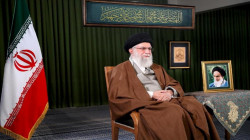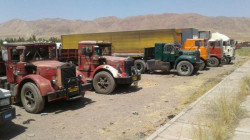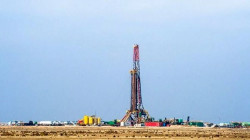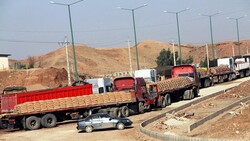Are Egypt and Iran ready to start a new chapter?
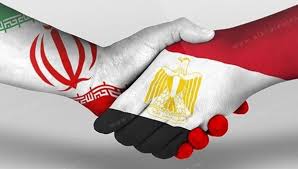
Shafaq News/ Representatives from Egypt and Iran have been meeting in Iraq since March with the mediation of Baghdad, according to Iraqi sources.
The talks covered tensions over Yemen, Lebanon, and Syria. The possibility of a meeting between the president of Egypt, Abdel Fattah el-Sisi, and the president of Iran, Ebrahim Raisi, was also discussed.
On Monday, Supreme Leader Ayatollah Ali Khamenei said in a meeting with Oman's Sultan that Tehran welcomes better diplomatic relations with Egypt.
After the normalisation of relations between Iran and Saudi Arabia, negotiations between Tehran and Cairo will likely proceed more seriously.
The issues causing tension have eased following Syria's entry into the Arab League and the possibility of peace between the Saudis and the Houthis in Yemen.
Fada-Hossein Maleki, a member of the Iranian parliament’s National Security and Foreign Policy Commission, confirmed the positive nature of negotiations between the two sides in Iraq and said relations between Tehran and Cairo would be restored soon, with the embassies of the two countries reopening.
Iran's foreign aims under Raisi's presidency have focused on neighbourhood policy, looking to the east, and relations with Muslim countries.
Connection with Egypt will allow Iran greater influence in the Arab world and closer relations with the Arab League countries, especially considering the huge economic influence of Saudi Arabia on Egypt.
Tehran started the process by normalising relations with Riyadh, and Tehran is keen to now start relations with Cairo.
Key obstacles
Egypt's foreign minister, Sameh Shoukry, in an interview with Egyptian broadcaster Nashat al-Daihi, assessed the developments between Iran and Saudi Arabia as important, saying that "Egypt will take steps based on the evaluation of these developments".
The security of the Arabian peninsula is Egypt's red line, and Tehran hoped to establish normal relations with Saudi Arabia, the United Arab Emirates and Bahrain in order to move forward with Cairo.
Sisi mentioned in November 2018 at the World Youth Forum that Egypt would not allow the security of the Persian Gulf to be undermined and that the Egyptian army would protect its brothers against any direct threat.
Many internal and external factors remain obstacles to establishing relations between the two countries.
From the perspective of Egypt, the US, some Persian Gulf countries and Israel, these are preventing the normalisation of relations.
In Iran, some hardliners believe that establishing relations with Egypt would be a betrayal of the Palestinian cause, an implicit acceptance of the Camp David Accords and a capitulation to Egyptian demands - such as changing the name of Khalid Islambouli Street in Tehran.
They believe that in exchange for changing the name, Egypt should also remove the flag of the former regime of the Kingdom of Iran from the Shah's tomb and remove the Pahlavi name from Cairo Street in Egypt.
After the Riyadh-Tehran normalisation, Iran changed the name of Sheikh Nimr Street - named after Shia cleric Sheikh Nimr al-Nimr, executed by Saudi Arabia in 2016 and the cause of the severance of relations - from one of the streets leading to the Saudi Arabian consulate in Mashhad.
So, a precedent for renaming Khalid Islamboli Street has been set.
Considering the de-escalation of Iran's relations with its Gulf neighbours, the opposition will likely diminish. The US will also grow less opposed to normalisation, considering the change in the pattern of regional interactions and the shift in US policy from the Middle East to focusing on China and the war in Ukraine.
Washington welcomed the normalisation of Iran-Saudi relations, even with the mediation of China. And Iran's economic situation is so dire that the hardliners will be willing to grant concessions to Egypt if it improves the situation and diverts people's attention away from domestic issues.
Economic benefits
The economy is another incentive to start relations. Iran's national currency has experienced a 14-fold decline since Donald Trump withdrew the US from nuclear talks in 2018, and the inflation rate is around 50 percent.
In Egypt, by the end of the 2020/2021 fiscal year, the country's total debt had reached $392bn.
That included $137bn in external debt, four times higher than it was in 2010 ($33.7bn). It also included $255bn in internal debt, almost double the domestic debt in 2010.
Iran's exports to Egypt in 2021 and 2022 were $6.92m and $5.08m, respectively, and Egypt's exports were $994,000 and $1.42m, respectively. Egypt is the most populous Arab country with the most significant wheat imports and has faced a serious challenge due to the crisis in Ukraine.
Iran is seeking to bypass US sanctions and export to neighbouring countries, and Egypt is a very good opportunity for exporting consumer goods.
Egypt can receive some consumer goods under the terms of Iran's embargo with appropriate and long-term conditions, and even use its national currency.
Tourism accounts for about 10-15 percent of Egypt's economy and provides millions of jobs.
Revenues increased to $13bn in 2021 from $3.80bn in 2020.
Iranian tourists are drawn to Egypt by celebrated Shia tombs, such as the burial place of the third imam of Shias and the tomb of Malik Ashtar, the famous general of the first imam of Shias.
In March, Egypt allowed Iranians to obtain visas on arrival in the Sinai Peninsula to reduce tensions and increase revenue from Iranian tourists.
In addition, Egypt provides a good opportunity to export Iranian oil to extra-regional markets. In the past few years, Tehran has sought to export its oil to Europe through the Sumed pipeline.
In May 2017, Egyptian authorities initially gave the green light to Iran's request, but it failed. Normalising relations could help to finalise this contract.
The pipeline would enable Iran to ratchet up its exports to the Mediterranean and southern Europe with a capacity of 2.5m barrels a day.
Geopolitical factors
Regarding regional geopolitical concerns, Iran considers Egypt to be a huge influence on peace in the Middle East.
The extension of the Abraham Accords to other Arab countries, the formation of the Arab Nato, and the Negev Summit, with the presence of Egypt, are among the reasons that Tehran intends to improve communications with Egypt.
This policy was not in vain. In June 2022, Egyptian security officials announced they would not join any coalition against Iran.
Other Arab nations may also support the reconciliation of Iran and Egypt because of this issue.
The US national security adviser, Jake Sullivan, said on 4 May that Washington would allow Israel freedom of action against Iran's nuclear threat. Following this, Iran complained to the Security Council and emphasised the right to respond to any reckless Israeli action.
Arabs are afraid of war between Iran, Israel, and the US.
Some Arab countries are trying to be safe from Tehran's retaliatory action in the event of these attacks by getting closer to Iran.
“Egypt would undoubtedly be affected even if it wasn't involved militarily,” Hassan Abu Talib, adviser to the Al-Ahram Centre for Political and Strategic Studies, said about the possibility of war between Iran and Israel.
Egypt is concerned about Iran's presence in the Gaza Strip and its close ties with Hamas and Islamic Jihad. The Strip is Egypt's direct security card. Cairo likes to use it in the tense relations between Hamas and Israel.
Cairo wants to be the top mediator of peace in the region and, as with the recent five-day assault on Gaza by Israel, plays the role of the top mediator between the groups involved.
The US has accepted this, and US President Joe Biden has made clear his appreciation.
Egypt's relationship with Iran makes it able to deal with this problem with more understanding. In its negotiations with Tehran, Egypt has requested that the Iranian authorities not carry out any activities against Israel on Egyptian soil.
Interference in the affairs of Arab countries is another accusation made by Egyptian officials against Iran.
Recent regional interactions have made this issue easier. The war in Yemen had become corrosive and after the meeting between Saudi officials and the Houthis in Yemen, the establishment of an Arab peace in Yemen is predicted.
Foreign interference
The insecurity in the Red Sea and the Bab al-Mandab Strait caused by the Houthis, which is affecting the traffic in the Suez Canal, is of grave concern to the Egyptians, and Iran can solve this security problem by influencing the Houthis.
In addition, the influence of Iranians in Iraq and among the militia groups that operate there ensures the security of Egyptian companies inside Iraq, which are based under the tripartite alliance of Iraq-Jordan-Egypt.
Egypt also supports Syria in its re-entering of the Arab League, which both weakens the terrorist groups inside Syria, which Cairo wants, and strengthens the project of transferring Egyptian gas to Lebanon through Syria from a security perspective.
After the regional de-escalation between Turkey, Qatar, Bahrain, Saudi Arabia, the UAE and Iran, Tehran and Cairo, are all ready to start a new chapter, despite the challenging legacy of more than four decades of confrontation.
However, some security concerns and the interference of foreign countries that see this re-opening of relations as a threat continue to challenge this reconciliation.
We have to wait and see if future developments will make this rapprochement possible.
